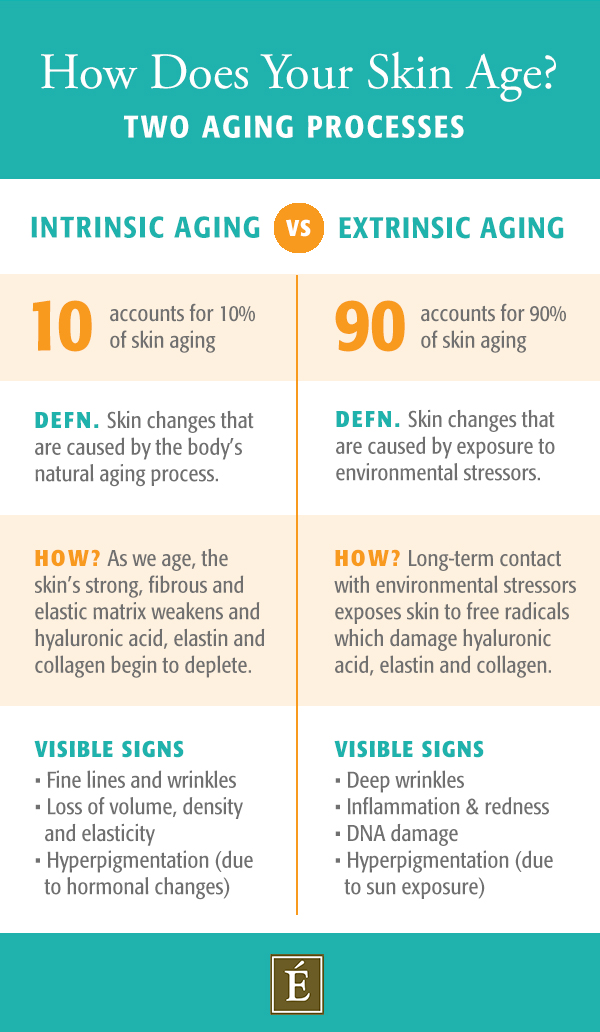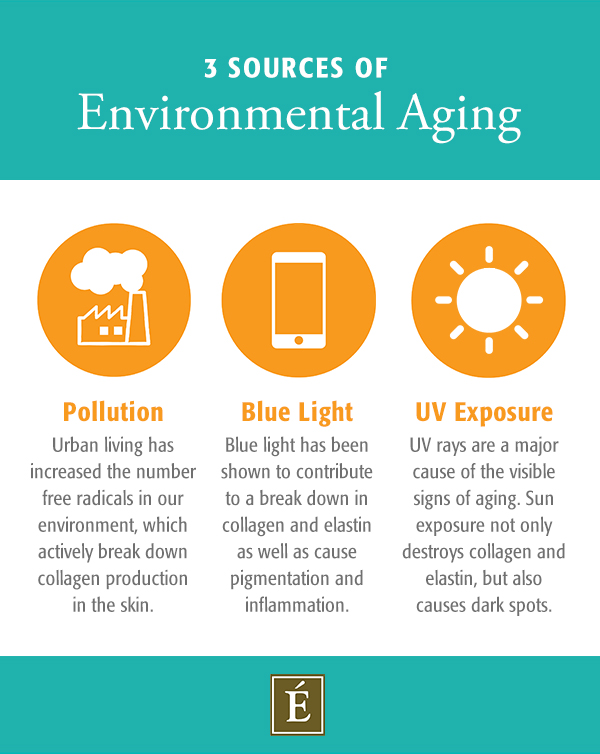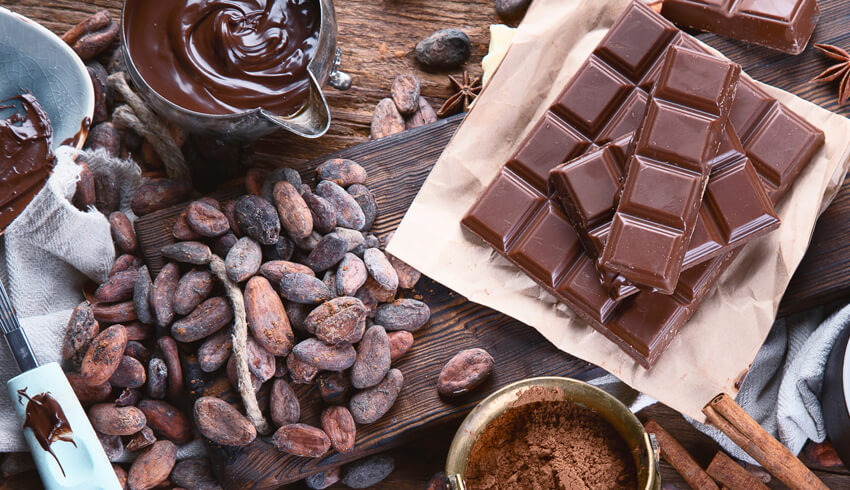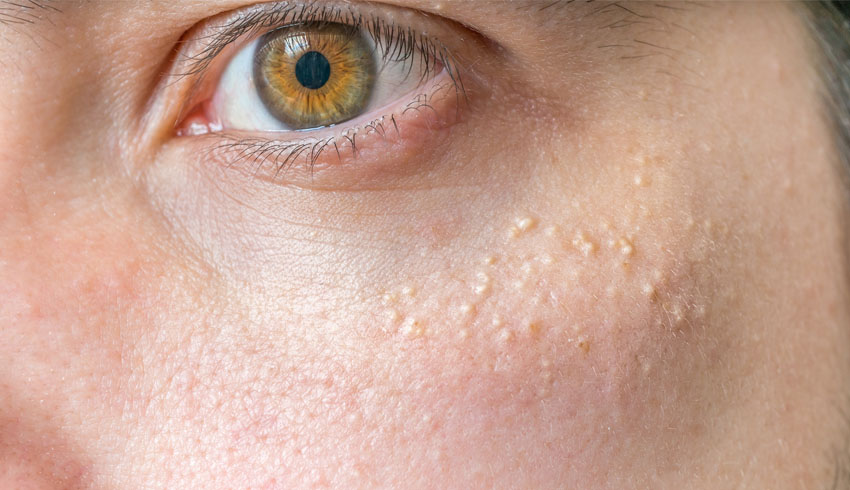.jpg?q=100)
Aging is inevitable. As we get older, our bodies’ natural aging processes kick in, causing the skin to sag and fine lines and wrinkles to set in. It’s a fact of life. But, did you know that time only accounts for 10% of skin changes? The remaining 90% is caused by external influences that accelerate the aging process. Read on to learn about three sources of environmental aging and how you can protect your environmentally stressed skin from external damage.
Intrinsic Vs. Extrinsic Aging
Skin aging is caused by two distinct processes: intrinsic and extrinsic aging.
Intrinsic Aging
Intrinsic aging is the natural and continual aging process by which cellular and biological functions slow. Over time, the skin’s strong, fibrous and elastic matrix begins to weaken, inhibiting skin cell turnover and contributing to hyaluronic acid, elastin and collagen depletion. As these essential compounds diminish, the skin loses the strength and resilience associated with a healthy and youthful complexion.

Extrinsic Aging
While intrinsic aging is unavoidable, extrinsic aging is more easily preventable. It is caused by a set of external factors that accelerate the aging process, including lifestyle choices like smoking, alcohol consumption and lack of exercise, as well as environmental stressors like pollution, blue-light radiation and UV exposure. These sources expose the skin to free radicals and oxidative stress which contribute to inflammaging - a process whereby chronic inflammation brought on by external stressors causes the skin to age prematurely.
 Sources Of Environmental Aging
Sources Of Environmental Aging
There are three main environmental factors that contribute to premature skin aging: pollution, blue light and UV exposure. Here is a closer look at each one.
Pollution
One of the major threats to healthy and youthful skin is air pollution. Urban living puts us in direct contact with particulate matter (PM), a complex mixture of harmful contaminants that wreak havoc on our complexions. Evidence increasingly shows a connection between long-term PM exposure and premature aging; in fact, studies have shown that a greater degree of PM exposure is associated with a larger number of dark spots and more pronounced nasolabial folds (smile lines).
How does this happen? Well, these minute particles expose the skin to free radicals that actively break down hyaluronic acid, collagen and elastin. When these become weakened, they lose the ability to keep skin hydrated, firm and elastic. Without a strong and secure structure, skin loses its density and bounce; it begins to loosen and sag and fine lines and wrinkles set in.
Blue Light
With the increasing adoption of new technology, blue light has become another factor to consider in skin aging. Blue light emits from many sources, including the sun, our cellphones, computers, TVs and even lightbulbs. According to Eminence Organics International Trainer Brian Goodwin, we are typically exposed to blue light for 13 hours a day; over time, this daily exposure compounds and poses a serious threat to skin health.
Blue light’s short wavelength is associated with higher energy output and a greater potential for damage. In 2010, research by the Journal of Investigative Dermatology found more pigment, redness and swelling in skin exposed to blue light from the sun than skin exposed to similar levels of UVA rays. In addition to triggering inflammation and redness, blue light stimulates the production of free radicals (which we know are major culprits of premature skin aging).

UV Exposure
Sun exposure plays perhaps the biggest role in aging our complexions. The sun has several different types of rays (including blue light) but those that cause the most concern are UVA and UVB rays. UVA rays penetrate deep into the skin’s layers, exposing otherwise healthy skin to damaging free radicals. UVB rays, on the other hand, penetrate only the skin’s outermost layer where they interact with melanocytes (the cells that are responsible for skin pigmentation). Melanocytes are your first line of protection against sun damage; when they are exposed to the sun, they release melanin. This protective pigment absorbs UV rays and shields the skin’s deeper layers from sun damage. However, overexposure can lead to an overproduction of melanin, which presents as dark spots and uneven skin tone.
How To Protect Your Skin
Minimizing exposure and adjusting your lifestyle habits are your best defense against the aging effects of environmental stressors. However, you can also adjust your skin care routine to provide additional protection and keep the appearance of your skin looking healthy and youthful.
Ingredients that Replenish, Protect & Brighten
You can enhance your skin's health with additional antioxidant-rich ingredients that replenish your skin and protect it from the drying effects of environmental pollution and sun damage.
Vitamin C is one major antioxidant ingredient that keeps your skin looking bright, healthy and glowing! Incorporate Vitamin C into your daily skin care ritual with our Citrus & Kale Potent C+E Serum. It’s loaded with ingredients like avocado, hyaluronic acid, botanical ferulic acid and citrus oils which offer antioxidant benefits and intense hydration that helps the skin look firm and plump. Vitamin C from lime juice also tones and balances the skin. You can try a product like the Lime Refresh Tonique if you’re after an antioxidant-rich toner that helps the skin looking fresher and balanced.
Perhaps you have mature skin? You’ll love the Citrus & Kale Potent C+E Masque, a cream-gel formula enriched with potent Vitamin C and antioxidants for skin that appears smooth and firm. This nutrient-rich mask is designed to reduce the appearance of fine lines and wrinkles.
Birch water, snow mushroom and reishi mushroom are other ingredients that deliver essential moisture and nutrients as well as minimize the visible signs of aging brought on by pollution, blue light and UV rays.
Birch water is a powerhouse sap that is found in our Birch Water Purifying Essence. Natalie calls it "nature's sports drink" for its beneficial blend of electrolytes, flavonoids, amino acids, proteins, enzymes and vitamins. Not sure how to add a facial essence to your skin care routine? Check out this article for our how-to guide on what is an essence.
Adaptogens are another must. These mushrooms, plants and herbs have roots in Chinese and Ayurvedic medicine, where they have been used for thousands of years due to their restorative and balancing properties. Perhaps the most famous adaptogen is the reishi mushroom. Also known as the "mushroom of immortality," this 'shroom contains over 400 bio-active compounds with rejuvenating properties. You can find reishi mushroom and snow mushroom (another powerful adaptogen) in the Snow Mushroom & Reishi Masque.
For a brighter complexion, try the Bright Skin Masque. The Bright Skin Masque evens out skin tone for a radiant and glowing-looking complexion. It's formulated with Natural Hydroquinone Alternative and Swiss Alpine Plant Extracts help brighten skin’s appearance and reduce the appearance of dark spots and the signs of aging.
Does your skin show the effects of environmental aging? Visit an Eminence Organics Spa Partner near you for a customized routine to protect your complexion




.jpg)
